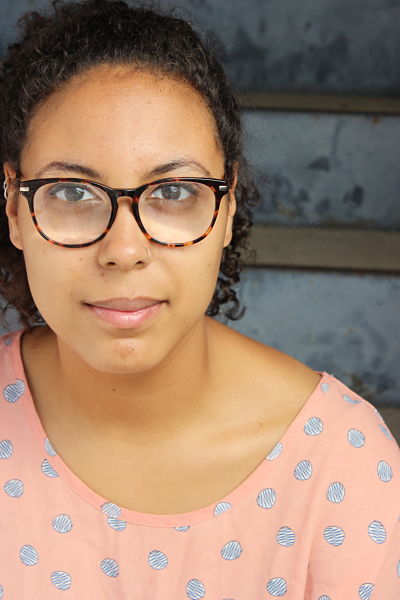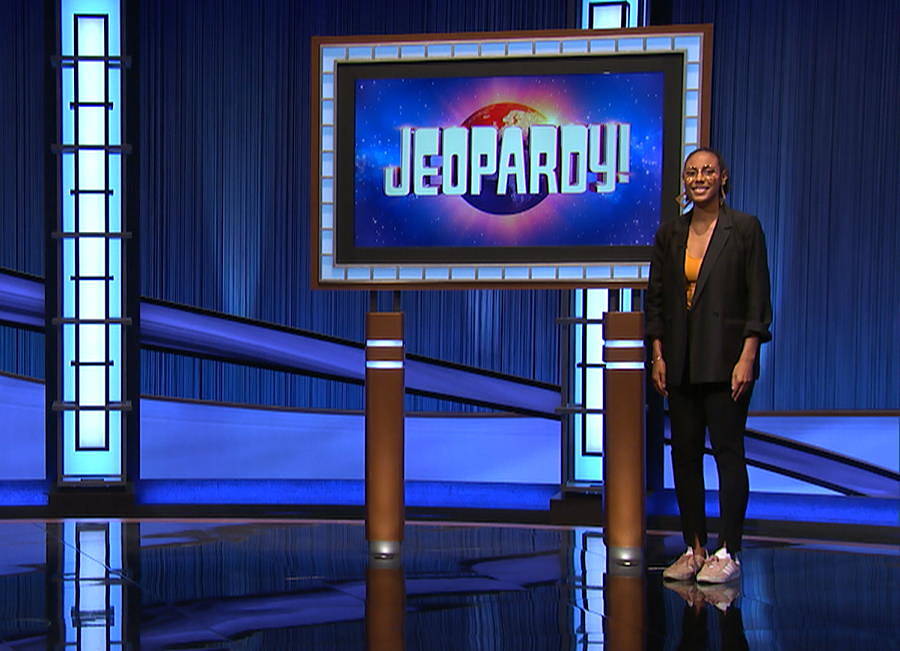Recently the Literary Managers and Dramaturgs of Americas (LMDA) launched a campaign called #ISpyDramaturgy. The thought is to uplift acts of dramaturgy that don’t formally happen within our theatrical field. Even so, my favorite examples still live within the arts—like a thread on orchestration moments in musicals, or one on a book on digital dance cultures, or one about nonprofit governance admin. In early October, dozens of us spotted dramaturg Madison Mae Williams competing on Jeopardy and speaking eloquently about her job. Currently, Williams is a Ph.D. student at the University of California, San Diego, where her focus spans musical theatre, poetry, and Africana Studies. Like most dramaturgs, Williams stumbled upon the discipline as she was exiting her undergrad studies.
In a recent interview, we chatted through her youthful dream of competing on Jeopardy, her dramaturgical origins, and her practice.
YASMIN ZACARIA MIKHAIEL: On the evening of Oct. 7, I was scrolling Twitter and I started seeing mutuals sharing that there was a dramaturg on Jeopardy, and that it was probably one of the few times that our field had been broadcast to nationwide audience. How did you find yourself on Jeopardy? And what’s your relationship with the game show?
MADISON MAE WILLIAMS: So Jeopardy is a show that I’ve always wanted to be on. It was something that I had on my bucket list from a really young age. I tried out for like the kids’ tournament and the teen tournament growing up, but never got in. Back in May, I found out that they had their online test available to take any time—they used to have it only scheduled a certain number of times per year, but they made it available to take any time just during pandemic times. Kind of on a whim, I took the test and didn’t think very much of it, and then got an email a couple weeks later saying, “We’d like you to move on to the next round of auditions.”

I went through two more rounds of auditions after that, which were on Zoom, then found myself as part of the contestant pool. One logistical thing that they let you know is that once you go through all the rounds of auditions and they like you and want to have you on, you go into a pool for up to 18 months. If you don’t hear from them within 18 months, they say, take the test again, go through the whole process. So I didn’t expect very much; I didn’t expect to hear from them. And then probably like six or eight weeks later, I got an email from them saying, “Hey, you want to come out in August for the show?” I said yes, because it’s just over an hour-and-15-minute drive from San Diego up to Culver City. I had a lovely time on my day of filming, where I lost miserably to the reigning champ, Matt Amodio. But it was great; I had a lot of fun. I got to fulfill a childhood dream.
A dramaturg had to go through auditions, huh?
I know, I know—switching it up a little bit from what side of the table I’d normally sit on in audition rooms, but it was kind of fun!
How did you choose your fun fact? And was there an audience reaction to explaining dramaturgy?
Normally, had there been more of an audience, there might have been more of reaction. But because of pandemic times, and just limited amount of people in the studio, the only audience was other contestant members. They all seemed enthusiastic and interested in finding out what a dramaturg was and what the role looks like. In terms of picking my fun fact, I wanted to have something slightly more interesting than, “Oh, I ran into this celebrity one time” or “Oh, this one thing happened to me when I was on vacation.” Because, you know, sometimes those stories can be a little boring. I figured, why not explain what dramaturgy is to an audience who may or may not know what the differences are in terms of production versus working under new-play development? Just giving a little bit of overview for those who haven’t seen Smash, which is the only other incidence of dramaturgical representation in pop culture that I can think of.
Can you talk about what approach you took in describing it for folks?
They give you a limited amount of time to explain whatever your fun fact is, right? Going in, I thought, if I had to explain dramaturgy to somebody who’s never heard of it before, has no context for what the role is, how would I boil it down in a way that would make sense for a broader audience? So I came up with a little script for what I was gonna say. I said that while the role can differ depending on whether you’re working on new-play development or in production, the role of a dramaturg, generally speaking, refers to someone who works in the capacity of a researcher or advisor on a theatrical production. My little line was: I’m there to ask questions and help answer them, which I think is really a useful way of thinking through ways to be useful in the room.
What does your dramaturgy practice look like?
That’s always the hardest question to describe, because it definitely can differ depending on who I’m working with, what are the needs of the production, how much historical research I’m doing, how much cultural research, and where a production is at in terms of development. With my process, I like to work really closely with the playwright, if they’re alive. That is something that I’m really passionate about, especially as someone who’s really passionate about theatrical work that is focused on uplifting the voices of folks of marginalized identities. That’s tracks not only in my practice as a dramaturg but also as an educator, as someone who works in higher education, and as an artist, broadly speaking. I hope that answered that question—that was kind of a broad answer to what my process looks like.
I think so. I think some of that breadth is purposeful on our part as dramaturgs, because we want to be able to plug in wherever we’re needed as well.
Exactly. And like I said, because those needs can look so different depending on what houses you’re working with, the people who are in the room, their expectations of a dramaturgical relationship—those can all be factors that affect what a process looks like.
How did you personally discover dramaturgy? When did that happen for you?
I think I first came into more awareness of dramaturgy as a practice in undergrad. I went to Hampshire College in Amherst, Mass. I didn’t know a whole lot about it at that point; it was sort of this mysterious field, but it sounded interesting in regard to engaging with specifically historical research and supporting productions from that lens. I got into production dramaturgy when I came to grad school at University California San Diego (UCSD), working with the MFA playwrights and working with MFA directors, and sort of coming into a process where I was working on both new-play development and on department productions that had more of a historical bent and helping with research and support there. That was sort of how I dove into that path, and now I’m working professionally with many different houses on mostly new-play development. But I’m always happy to go where I am needed.
Is there a specific genre or type of play that you enjoy working on?
I really like working on new work, specifically new Black work by new Black playwrights. It’s something I’m really passionate about. I have a close relationship with Dave Harris, who I’ve worked with for many years. While it’s not necessarily a specific genre, and I don’t want to equate new Black work with a specific genre of theatre, that is something that I do have a fair amount of familiarity with it and I’m really passionate about.
How does your lived experience show up in your dramaturgy?
I don’t think our lived experience is separable from any of the work that we do, right? We show up as we are with our histories, with our knowledge bases, with our communities. I think that regardless of whether I’m working on a play that’s hundreds of years old or a new work, I’m going to show up and be my authentic self and push the production toward a space of authenticity. I think that’s something that is one of my major skills as dramaturg, and something that I enjoy collaborating with other people on—thinking about, how do we create a vision for this play that is cohesive, that speaks to the needs and goals of everyone involved, not only just the director and the playwright, but everyone from the management side to the designer side to performance side to the producing side, and thinking about ways that I can help be a facilitator of that process.
Personally, I’m really grateful for the dramaturgy aunties who have shown up for me and offered real talk when I needed it. Who do you carry with you as a part of your process?
This is a good question. I did not have many dramaturgy mentors going through this process, so the people who I work with the most are mostly playwrights and directors. The folks who I have really sort of honed my skills with, not only in the university setting, but sort of in the Southern California theatre scene—those are folks who I walk with a lot. Also all of my academic mentors as well, ranging from undergrad to now, even if they themselves do not identify as dramaturgs or have worked in that field. Their approaches to research and also to having truth in representation are meaningful to me and are woven throughout my process as well. If you want me to name names, I can shout out to specifically Dave Harris and Lamar Perry, who I collaborate with frequently. I’m really grateful for their specific support and horizontal mentorship, and thinking about the ways that we all grow together as artists too.
You’re currently a practicing artist, but also a graduate student at UCSD. I’m curious what your studies look like there.
My dissertation project, which I am in the throes of writing now, focuses on performance of counterculture in the long ’60s, using alienation as a lens. So not only focusing on what Marx and Brecht say about alienation, even though they’re kind of my touchstones, but thinking through different theorists contemporary to the time and folks like Antonin Artaud, thinking about the Black Power and Black Arts movements, and thinking about ways that alienation and counter-alienation are ways of thinking through what performances of this time are doing and their relevancy to today. The goal is to wrap that all up by June 2023. Fingers crossed!
It seems like you’re on your way. Is there anything else you’d like to share that we haven’t touched upon?
I’ll return briefly to theatre Twitter, because while I do have a Twitter account, I’m not on it very often. But it was just so refreshing to see so many people excited about dramaturgy, and excited to see someone out there representing a very small part of a very large field. I’m just grateful for the outpouring of love and support from folks I don’t know but I feel very connected to just by means of being part of a larger field. I’m hoping to see more dramaturgs in media, not only on Jeopardy, but Jeopardy and beyond.
Yasmin Zacaria Mikhaiel (she/they) is a Chicago-based arts journalist, dramaturg, and oral historian. Learn more at yasminzacaria.com and follow them on Twitter @yasminzacaria.


